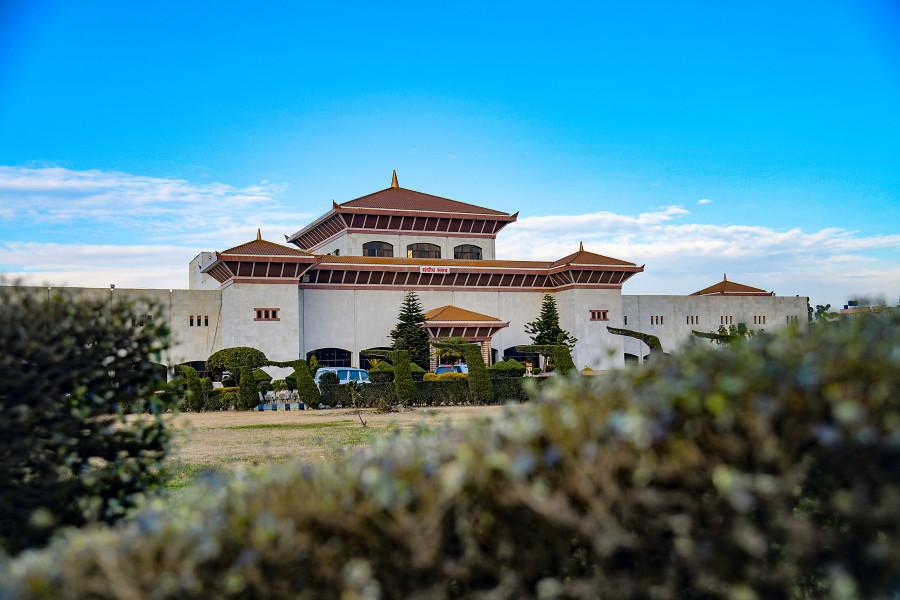National
Sudden move to prorogue Parliament undermines legislature, experts say
The budget session was ended saying it lacked business, but there are some crucial bills, including one related to citizenship, pending for approval.
Binod Ghimire
On Thursday, when Standing Committee members of the ruling Nepal Comunist Party were waiting for the meeting to convene, Prime Minister KP Sharma Oli suddenly called a Cabinet meeting.
The Cabinet meeting ended as soon as it had started. Some of the ministers, who are also Standing Committee members, even could not attend the meeting, which had taken a decision to recommend prorogation of the Parliament session. Sheetal Niwas swiftly endorsed the recommendation. Sessions of both the House of Representatives and the National Assembly ended from 5pm that very day.
Those in government argue that prorogation of a parliamentary session is purely the prerogative of the government and that since there was no business for the House, it was prorogued.
Experts on parliamentary affairs and constitutional matters, however, say it’s the government that should provide business for the House and that the government must make sure that crucial bills have gone through the House before a session is prorogued.
The intent, the timing and the process also show the decision to prorogue the House session on Thursday was wrong, according to analysts.
Speculations are rife that Oli will introduce an ordinance to split his party where the opposing faction is demanding his resignation.
“Opting for an ordinance after killing the House session is unconstitutional and against democratic practice,” senior advocate Bhimarjun Acharya told the Post. “In parliamentary democracy, the government must be under the constitution and Parliament. On the contrary, the Oli government has treated Parliament like one of its arms.”
The budget session of Parliament that was abruptly ended had some crucial bills related to citizenship and the federal civil service to endorse.
The sixth session, which lasted 58 days, endorsed just six bills in addition to the budget and second amendment to the constitution.
Experts say the constitution envisions issuance of an ordinance for some specific purpose and the executive should be careful not to misuse the provision.
Article 114 says: “At any time, except when both Houses of the federal parliament are in session, circumstances exist which render it necessary to take immediate action, the President may, on recommendation of the council of ministers, promulgate an ordinance.”
This time around, it looks like the House session was prorogued with an intent to bring an ordinance to facilitate the prime minister in his next move, say constitutional experts.
According to Acharya, the government move of ending the House session without consulting with the Speaker and seeking the consent of the Business Advisory Committee is unconstitutional.
“One fourth of the lawmakers, using their constitutional authority, must seek resumption of the House so as to stop Oli from taking any step bypassing Parliament,” said Acharya.
Article 93 (3) of the constitution says if during the prorogation or recess of the session of the House of Representatives, one fourth of the total number of its members write a petition that it is desirable to convene a session or meeting, the President shall specify the date and time for such session or meeting.
The executive undermining Parliament is against the spirit of the principle of separation of powers, say experts. Nepal may have attained political stability after decades of turmoil but failure to establish the rule of law will hardly mean anything for the country and the people, according to them.
In a functioning democracy, the laws need to be enacted by Parliament on behalf of the sovereign people.
“Enactment of laws is the main function of Parliament, which also elects the executive,” said Som Bahadur Thapa, former secretary at the Parliament Secretariat. “The executive cannot undermine the role of Parliament that elected it. The Oli government must understand this.”
According to Thapa, a dispute within the ruling party leading to the end of the House session sets a negative precedent.
Thapa, who has worked in Parliament for around three decades, said the budget session normally ends before Dashain (September).
“There are rare instances when it has ended in the first week of July,” said Thapa.




 19.12°C Kathmandu
19.12°C Kathmandu














